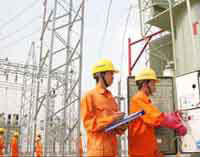INDOCHINA INTERNATIONAL CONSULTING CO., LTD
HO Add: 62L/36 Nguyên Hồng, Ward 11, Bình Thạnh District, HCMC - Vietnam
Biz Office Add: #48 Road No 11, Quarter 6, Hiệp Binh Chánh Ward, Thủ Đức, HCMC - Vietnam
®Source: http://viipip.com should be clearly quoted for any use of information extracted from our website.
Publication permit No: 60/GP-TTĐT , April 05, 2010.


In the study, researchers considered the impact of rises in electricity rates on gross domestic product and on the consumer price index and found measurable negative impacts.
Pushing Viet Nam’s electricity rates up to regional levels would also be unreasonable, the researchers concluded, since the costs of labour and materials in Viet Nam continued to be lower than in neighbouring countries.
The research also cast a light on the role of Electricity of Viet Nam (EVN), which accounts for 74 per cent of electricity output and holds a 100-per-cent monopoly on electricity transmission.
EVN was a heavily capitalised and highly profitable public utility which has diverted resources to significant investments in other business sectors, e.g., telecommunications and finance, said CEPR director Nguyen Duc Thanh, who headed the research team.
This suggested that EVN was able to profit from existing electricily rates, Thanh said, mentioning that the fact that electricity output was not increasing rapidly enough to satisfy increasingly high demand was more likely due to problems in management than to a lack of profitability under current electricily rate structures.
If EVN’s monopoly could be overcome and productivity in the power-generating sector increased by just 2 per cent, the researchers argued, Viet Nam would not need to increase the rates and might even be able to lower them by 2 per cent.
"In a competitive market, the price of a product can be lowered when the productivity of the sector is raised, and this can be easily seen in the electrical sector," said Thanh.
In theory, he argued, higher electricity rates would lower demand because they would encourage households and industrial users to conserve on electricity. In fact, however, users are already striving to reduce costs, so higher rates simply put economic pressure on companies, especially small – and medium-sized enterprises struggling to compete.
The head of the Institute for Development Studies, Nguyen Quang A, said Viet Nam was consuming 800kWh per capita per year, compared to 3,400kWh globally.
"Average power consumption per capita in Viet Nam is less than one-fifth of that in Thailand, and it is obvious that demand for power will continue rising fast in the future," agreed Thanh. "What EVN needs to do now is to improve supply instead of raising rates."
A competitive environment would be a driving force for companies to expand production, he said.
Nguyen Trung, a member of the research team, also argued that, before attempting to raise electricity prices, EVN needed to demonstrate what it had been doing to increase productivity.
Quang A wondered whether high electricity costs were a direct outgrowth of EVN’s monopoly in the power sector, saying, "EVN needs to make public its figures on productivity and profit in recent years. There should be an independent agency to supervise EVN".
- FDI capital continues to pour into Vietnam (6/11/2025 1:20:33 PM)
- Thanh Hoa receives good news: Preparing to have an additional industrial park of up to 470 hectares, creating jobs for nearly 30,000 people (6/11/2025 1:15:09 PM)
- Industrial Park Real Estate: Waiting for the New Generation of FDI (6/11/2025 1:10:15 PM)
- A wealthy Vietnamese city will have two special economic zones after the merger (6/11/2025 1:04:42 PM)
- 30 billion USD capital FDI in Việt Nam by 2025, a series of "ông big" races to expand the land fund (6/11/2025 12:55:26 PM)
- the 2nd largest city in the North will start construction on an international economic zone (6/11/2025 12:50:20 PM)
- Japanese giant Sumitomo continues to want to build an industrial park in the countrys fourth smallest province. (6/11/2025 12:40:45 PM)
- 3 foreign corporations want to invest billions of dollars in Ba Ria - Vung Tau (6/11/2025 12:34:30 PM)
- Lotte Group member starts construction of nearly 1,000 billion VND logistics center in the province with the most industrial parks in Vietnam (6/11/2025 12:33:26 PM)
- Forming a regional center for manufacturing spare parts and components (6/11/2025 12:24:08 PM)
- Vietnams first wafer factory is about to start construction (6/11/2025 12:19:09 PM)
- Dong Nai attracts foreign investors (6/11/2025 12:13:27 PM)
- Tay Ninhs largest industrial park welcomes a $150 million high-end knitted fabric factory project (6/11/2025 12:11:00 PM)
- (6/11/2025 12:09:10 PM)
- Vietnam will become a destination for Chinese investors in the future (11/6/2023 1:03:19 PM)

- FDI capital continues to pour into Vietnam
- Thanh Hoa receives good news: Preparing to have an additional industrial park of up to 470 hectares, creating jobs for nearly 30,000 people
- Industrial Park Real Estate: Waiting for the New Generation of FDI
- A wealthy Vietnamese city will have two special economic zones after the merger
- 30 billion USD capital FDI in Việt Nam by 2025, a series of "ông big" races to expand the land fund










 ADB: Vietnam’s 2009 GDP growth to be highest in South East Asia
ADB: Vietnam’s 2009 GDP growth to be highest in South East Asia MGM Grand Ho Tram: Vietnam’s First ‘Las Vegas Style’ Integrated Resort
MGM Grand Ho Tram: Vietnam’s First ‘Las Vegas Style’ Integrated Resort Nha Trang’s Twin Towers project licenced
Nha Trang’s Twin Towers project licenced Foreign investors still have good opportunities in Vietnam
Foreign investors still have good opportunities in Vietnam Sierra Wireless gets a foot in Vietnam’s ICT market
Sierra Wireless gets a foot in Vietnam’s ICT market